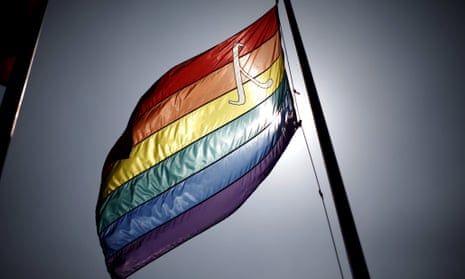Gay rights activists have welcomed the decriminalisation of homosexuality in Mozambique but said they still face a long struggle for full equality.
A penal code that came into force on Monday erased Portuguese colonial laws dating back to 1886 that could condemn anyone “who habitually engages in vices against nature” to three years’ hard labour.
The move was largely symbolic since there have been no known prosecutions for homosexuality since Mozambique gained independence 40 years ago last week.
“We do welcome it but we don’t actually see it as something that will bring a change for how LGBT people live in Mozambique,” said Carina Capitine, spokesperson for the country’s only gay rights organisation, Lambda, which lobbied for the change.
The group has been fighting for seven years for official recognition from the government. “That is the battle we have next,” Capitine said. “A lot of people are asking about marriage or adoption but we can’t think about that yet. Our registration is the key thing for us. We haven’t heard much but we are all pushing and believe we will have it soon.”
Lambda has 40-50 members and provides counselling, legal assistance and health advice. Registration would mean access to funding and tax exemption status, and would be a step towards acceptance for the country’s LGBT community. Mozambique has a reputation for more relaxed social attitudes than many countries in Africa.
Capitine added: “We are quite a tolerant people. The LGBT community is not targeted by violent acts as in some African countries. But we do face discrimination here, for example when parents say you cannot live here until you change.”
Public displays of same-sex affection are rare but not unknown. “It will depend where you’re going, how you act in general. Some people are more open, some are more shy. It depends where you are and who you are with.”
The mainstream media tend to ignore the subject but the internet has provided a platform for raising awareness. Dercio Tsandzana, a leading activist and blogger in Mozambique, said: “In newspapers you can’t find it, in local media they don’t talk about it, but you can go to Facebook and find Lambda: ‘Look for us, we exist.’”
He added: “We can’t say the government is open-minded. It is one thing to open laws, another to give recognition to an organisation like Lambda. They don’t say ‘We don’t accept’, but they don’t say ‘We accept’. This is about more than laws. It’s not easy but we have to talk.”
Joaquim Chissano, a former Mozambican president, appealed for a change in attitudes in an open letter to African leaders last year. “We can no longer afford to discriminate against people on the basis of age, sex, ethnicity, migrant status, sexual orientation and gender identity, or any other basis – we need to unleash the full potential of everyone,” he wrote.
“As an African who has been around a long time, I understand the resistance to these ideas. But I can also step back and see that the larger course of human history, especially of the past century or so, is one of expanding human rights and freedoms.”
Same-sex relations are illegal in 36 of the continent’s 54 countries, according to Amnesty International, and punishable by death in Sudan, Nigeria and Mauritania. Anti-gay statements from political leaders are common in Mozambique’s neighbours Zambia and Zimbabwe.
But LGBT organisations have recently scored legal victories allowing them to register in Botswana and Kenya, and last year the African Commission on Human and Peoples’ Rights passed a resolution calling on national leaders on the continent to respect the human rights and dignity of LGBT people.
Graeme Reid, director of the LGBT rights programme at Human Rights Watch, said: “We’ve seen small incremental steps towards greater equality in sub-Saharan Africa. If you look at the overall picture of the last 25 years and look at the strength and resilience of LGBT movements, that’s a positive sign. In some ways, the homophobia we see is a reaction against this increased visibility.”
He added: “It’s difficult to talk about an overall pattern but we have seen some positive developments over the last 18 months.”
Peter Tatchell, a veteran human rights and gay rights campaigner, said of the Mozambique law: “It’s a wonderful development amid the often regressive anti-gay measures being taken by some other African countries like Nigeria, Cameroon, Uganda and the Gambia.
“The decriminalisation is the result of long patient lobbying by Mozambican LGBT activists and their African allies. This is the first step towards wider legal protection for LGBT people in Mozambique and for LGBT organisations to receive formal recognition and consultative status with government.”
He added: “The pattern across Africa is very uneven. South Africa leads the way. Mozambique has taken a first step in the same direction but most other African countries still criminalise same-sex relations and often ignore homophobic, biphobic and transphobic violence. LGBT human rights defenders in most African countries are at constant risk of arrest and of mob violence.”

Comments (…)
Sign in or create your Guardian account to join the discussion